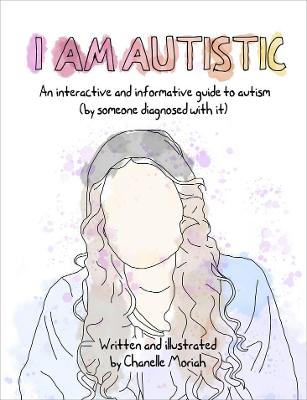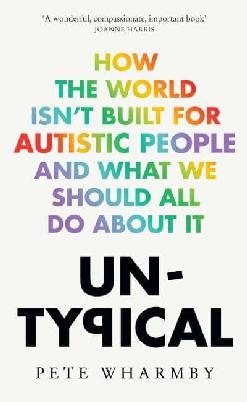It was a bright warm day in April and the clocks were striking six for the Autism Awareness Month Panel, part of Christchurch City Libraries’ celebration of Autism Acceptance Month, in Auaha Hīhī/Spark Place at Tūranga on Monday 7 April 2025.
Organised by my lovely colleagues Mik Clapson (they/them) and Alexandra O’Brien (she/her), the panel included four great speakers from different backgrounds; Karen Holmes (she/her), who works as an autism life coach for Autistic Innovations and has two adult daughters with autism (and questioning whether she is also neurodivergent); Ezra Muir (he/him) who comes from a family with many neurodivergent people, studies and works in neuroscience and cognition, and has community support experience; Alta Sacra (they/them) is AuDHD (autistic and ADHD), has worked in the health and disability sectors in Canterbury and the West Coast, and runs a group for autistic adults across Aotearoa; and Joanne Lawless (she/her), a facilitator for Altogether Autism, working with teachers/families of kids with autism or workplaces supporting people with autism, and who has two adult sons with autism.
Our chair was the indomitable Poppia Marriott (she/her), a veteran emcee and another of my fine colleagues, who started by reflecting on how great it was to have this panel discussion, and the neurodiverse people in her life.
Importance of a diagnosis?
After introductions from the panel, we started with the first question – how important is it to have a diagnosis? How has a diagnosis made a difference or impact for yourself or the people with autism in your life?
For Joanne, though her own children got diagnosed at a younger age, she works with people of all ages being diagnosed. She reflected that among the adults she has spoken to, a diagnosis was useful on a personal level and to help them understand themselves better. But unfortunately, for newly diagnosed adults, a diagnosis did not often help them get supports that simply aren’t there.
Atla reflected on their work with a range of people, and that the assessment process itself was a very personal one, but if somebody needed or was seeking supports, a diagnosis is essential – you don’t get them without one (and even if you do sometimes).
For Ezra in working with those diagnosing people, he saw two camps of people – people who need a diagnosis for accessing supports, and others (mainly adults) for whom the process was about identity and accepting themselves.
Karen saw it as a personal decision for adults and parents, and from the parent perspective, a diagnosis was practically a lot more help to have, as neurodivergent people often are labelled and treated differently regardless and helps with people understanding themselves.
Key barriers to adequate support and resources?
The second question was around what are the key barriers to accessing adequate support and resources, and what should people be aware of?
Karen noted that when families have challenges, they often need support and resources then and there, but a barrier is the extensive diagnostic process which takes time, all the while challenges are continuing or increasing. What would help is more immediate support provision, more professionals trained in neurodiversity, and better training and support for professionals.
Ezra talked about the main pathways for support – public and private. In the public system, an autism diagnosis is triaged based on support needs and it can be difficult for “independent” adults to get a diagnosis. For this group, private was often the only realistic option and this is still limited by availability and costs, and he also raised the interesting point of internalised barriers to pursuing or accessing diagnosis and support. He talked about how there are more supports available for children but still not enough funding and resources for what is needed.
Alta said there were multiple facets to this question, and that some key issues were the difficulties of the system itself and the need for more (or any) input from people with autism. They made a really important point - “we live in a world not designed for our experiences” - that the system is in opposition to how we need work with. Recent government policy changes have made the existing situation even worse, and resourcing is not consistent across the country. Another issue is that there is a big focus on physical support needs
Joanne talked about how one key barrier is a lack of compassion and understanding – people with autism are often seen as behaviourally challenging.
Key resources around autism?
The third question was around what are some key resources and support options around autism?
Joanne talked about Altogether Autism – from the inside perspective, it is an organisation that emphasises the need to listen to people with autism, uses evidence-based practices and information and advice, and is a good trusted starting point.
Alta noted that the increase in autistic voices and involvement in Altogether Autism is great, but also that in Aotearoa, there is no specific autistic-led autism organisation. They referred to an Australian website Reframing Autism that, while it refers to specific things in the Australian context, its content was still very relevant and useful. But above all, talking to the people around you.
Ezra said that trusted Aotearoa and Australian organisations are a good start. But he also said it is important to keep in mind conflicting studies and findings, and the changing state of the field and research when looking for things. He also mentioned keeping in mind experience and training – is the author or study looking at the relevant demographic.
Karen emphasised that personal accounts were most helpful, especially for adults given the variation in experiences. Autism NZ was a good organisation, but she made an insightful point that autism itself involves a different way of processing information, and it is vital and so helpful to understand this.
Recommended books?
The fourth question was that given we were in a library, what are some recommended books?
Karen liked I am Autistic by Chanelle Moriah, a great graphic novel around their experiences of autism.
Ezra mentioned Unmasking Autism.
Alta liked both these suggestions but also recommended just reading them all.
Joanne said that people should read the books that resonate with them, but also mentioned Untypical, Unbroken by Alexis Quinn, and Wild of Brain by Anissa Ljanta.
Speaker's choice questions
As the event was running low on time, it ended with offering each speaker a chance to quickly answer one of the questions given that spoke to them.
Joanne answered a question about the cultural perceptions of autism influencing diagnosis and support – that this was absolutely true. Her experience of working with early childhood centres with Samoan communities, and the challenges that different perceptions and words around autism posed for accessing support was really interesting.
Alta took a question around what was challenging – experiencing autism or experiencing how others react to it, and that this was big especially for later diagnosed adults was that people did not always see the actual experience of autism – not seeing the whole experience of people with autism and so not understanding it.
Ezra wanted to talk about some of the ‘myths’ around autism, and especially the idea that non-verbal people did not have the ability to express themselves or had different thoughts/experiences, or that they “lived in their own world” – this simply is not true.
Karen wished that people knew that “meltdowns” (as awkward a term as this is) were trauma-related responses to autism-related challenges, and that people need to be supportive and show empathy for people with autism, and those caring for or helping them.
It was a real shame to have to end the panel because it was such a great and enlightening discussion, and it was really good (and important!) to have a range of perspectives and to include autistic voices in this kind of discussion.
See and read more!
This event was part of Autism Acceptance Month at Christchurch City Libraries. There are other events throughout the month including:
- He Karu, He Taringa Film Screening
- Supporting Social Skills Workshop
- Sensory Hour at Tūranga and Redwood Library
As well as the books already mentioned Christchurch City Libraries also has some wonderful booklists on autism and neurodiversity. If there is something you have read or heard about that we don't have in our collection, why not put in a request for it?
Curious to know more about autism? This booklist includes, biographies, fiction and non-fiction titles that help demystify and celebrate autistic minds.
This booklist is for adults with ADHD and parents/carers helping their children to navigate life with ADHD.






Add a comment to: Challenges and diverse perspectives: Autism Acceptance Month Panel